by Naomi L. | November 30, 2016 | Blog, Creative Writing |
November 2016 has been an incredibly hectic month, hasn’t it? From the chaos surrounding the U.S. presidential election to the final sprints of NaNoWriMo, it certainly hasn’t been the easiest few weeks for many writers who actively follow politics. As it draws to a close, I confess I found myself more emotionally drained this month than I can recall feeling at any point during the last few years (and that’s saying something). Sounds like now would be a good time for some more inspirational words!
So just for fun, and as a little ray of sunshine for anyone else who may be needing it these days, here are ten inspirational quotes for hope and a brighter future. Enjoy!
 1) You may say I’m a dreamer, but I’m not the only one. I hope someday you’ll join us. And the world will live as one. – John Lennon
1) You may say I’m a dreamer, but I’m not the only one. I hope someday you’ll join us. And the world will live as one. – John Lennon
2) It’s really a wonder that I haven’t dropped all my ideals, because they seem so absurd and impossible to carry out. Yet I keep them, because in spite of everything, I still believe that people are really good at heart. – Anne Frank, The Diary of a Young Girl
3) We are only as strong as we are united, as weak as we are divided. – J.K. Rowling, Harry Potter and the Goblet of Fire
4) There is some good in this world, and it’s worth fighting for. – J.R.R. Tolkien, The Two Towers
5) Only when it is dark enough can you see the stars. – Martin Luther King Jr.
6) There is a saying in Tibetan, ‘Tragedy should be utilized as a source of strength.’ No matter what sort of difficulties, how painful experience is, if we lose our hope, that’s our real disaster. – Dalai Lama XIV
7) Remember, hope is a good thing, maybe the best of things, and no good thing ever dies. – Stephen King, The Shawshank Redemption
8) The road that is built in hope is more pleasant to the traveler than the road built in despair, even though they both lead to the same destination. – Marion Zimmer Bradley, The Fall of Atlantis
9) I am fundamentally an optimist. Whether that comes from nature or nurture, I cannot say. Part of being optimistic is keeping one’s head pointed toward the sun, one’s feet moving forward. There were many dark moments when my faith in humanity was sorely tested, but I would not and could not give myself up to despair. That way lays defeat and death. – Nelson Mandela, Long Walk to Freedom: Autobiography of Nelson Mandela
10) The best way to not feel hopeless is to get up and do something. Don’t wait for good things to happen to you. If you go out and make some good things happen, you will fill the world with hope, you will fill yourself with hope. – President Barack Obama
What are your thoughts on these quotes? Any others you would add to the list?
by Naomi L. | November 23, 2016 | Blog, Creative Writing |
Remember that list of commonly misspelled expressions I shared last week? Well, here are a few more to add to your notes. I know, sometimes it seems like there are way too many of these to keep track of. Anyway, while you’re working on your novel for NaNoWriMo or any other writing projects, it may be worth keeping a long list of these expressions as a reference. You never know when you might find yourself second-guessing the spelling of an idiom, right?
So for further reference, here are 12 more expressions you may have misheard and/or written incorrectly. Enjoy!
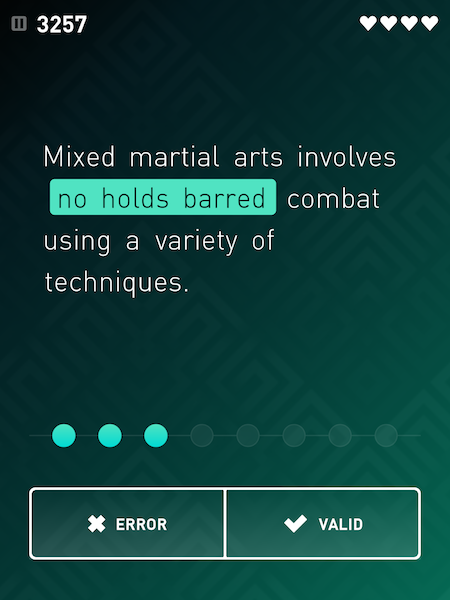 1) Beck and call: indicates being constantly ready to obey someone’s orders immediately. Write “beck and call”, not “beckon call”.
1) Beck and call: indicates being constantly ready to obey someone’s orders immediately. Write “beck and call”, not “beckon call”.
2) By and large: an alternative expression for “on the whole” or “everything considered”. Write “by and large”, not “by in large” nor “buy and large”.
3) Curb your appetite: to restrain or keep your appetite in check. Write “curb your appetite”, not “curve your appetite”.
4) Foolproof: describes something that is incapable of going wrong or being misused. Write “foolproof”, not “full proof”.
5) In this day and age: an alternative expression for “at the present time” or “in the modern age”. Write “in this day and age”, not “in this day in age”.
6) Leeway: indicates the available amount of freedom to move or act or a margin of safety. Write “leeway”, not “leadway”.
7) Nitpicking: denotes looking for small insignificant errors or faults, usually in order to criticize unnecessarily. Write “nitpicking”, not “knitpicking”.
8) No holds barred: indicates that no rules or restrictions apply in a dispute or conflict. Write “no holds barred”, not “no holes barred”.
9) Rank and file: an expression of military origin referring to the ordinary members of an organization as opposed to its leaders. Write “rank and file”, not “ranking file”.
10) Sneak peek: describes a special preview of something before it becomes generally available. Write “sneak peek”, not “sneak peak”.
11) Vice versa: a Latin phrase denoting that a statement remains true when the objects are switched. Write “vice versa”, not “vice a versa”.
12) With all due respect: a polite expression used to mitigate the effect of a disagreement or criticism. Write “with all due respect”, not “with all do respect”.
What are your thoughts on these expressions and idioms? Any others you would add to this list?
by Naomi L. | November 16, 2016 | Blog, Creative Writing |
Still working on that NaNoWriMo novel? Whether you’re trying to churn out a 50,000-word novel or just sticking to short stories for now, impeccable writing skills are key to success in the long run, and that includes proper grammar and spelling of everything from simple words to long phrases and idioms. There are plenty of everyday expressions that we’re used to hearing but not reading or writing, and this often leads to misspellings. It never hurts to keep notes of these misheard idioms for future reference, which is why I compiled another list of words and phrases from the Elevate – Brain Training app, this time from the Expression game.
So continuing on a trend of writing lessons from Elevate, here are 14 common expressions that you may be writing incorrectly. Enjoy!
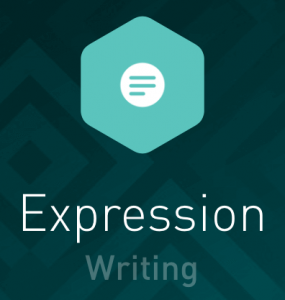 1) All of a sudden: an alternative expression for “suddenly”. Write “all of a sudden”, not “all of the sudden”.
1) All of a sudden: an alternative expression for “suddenly”. Write “all of a sudden”, not “all of the sudden”.
2) Compliments of the house: indicates that something is being given for free. Write “compliments of the house”, not “complements of the house”.
3) Couldn’t care less: expresses a complete lack of interest. Write “couldn’t care less”, not “could care less”.
4) Deep-seated: describes something firmly established at a profound level. Write “deep-seated”, not “deep-seeded”.
5) Due diligence: the reasonable steps taken to satisfy a legal requirement. Write “due diligence”, not “do diligence”.
6) En route: a French expression meaning “during the course of” or “on the way”. Write “en route”, not “on route”.
7) For all intents and purposes: indicates that a concept applies in all important respects. Write “for all intents and purposes”, not “for all intensive purposes”.
8) Free rein: indicates freedom of action or expression. Write “free rein”, not “free reign”.
9) Harebrained: describes an idea that is rash or ill-advised. Write “harebrained”, not “hairbrained”. (Thanks to Robert Kirkendall for this one!)
10) Lo and behold: presents a surprising situation with the suggestion that it could have been predicted. Write “lo and behold”, not “low and behold”.
11) No love lost: indicates a mutual dislike between parties. Write “no love lost”, not “no love loss”.
12) Rife with: denotes that someone or something is full of a given emotion or idea. Write “rife with”, not “ripe with”.
13) Sleight of hand: dexterity typically used in performing tricks. Write “sleight of hand”, not “slight of hand” nor “slide of hand”. (Thanks to M.C. Tuggle for this one!)
14) Through the wringer: indicates subjecting someone to a stressful experience. Write “through the wringer”, not “through the ringer”.
Have you ever gotten any of these expressions wrong? What other expressions would you add to this list?
by Naomi L. | November 9, 2016 | Blog, Creative Writing, Featured |
Rhetoric: the beautiful art of persuasive speaking and writing that all ambitious people strive to master. It’s a powerful tool for success; within a social and communicative species like ours, so many goals can be achieved simply through the use of effective speech and composition. English is rife with handy rhetorical devices, and while you work on that NaNoWriMo novel, you should consider how to use language to its greatest potential, as much among your characters as with your audience.
So for your reference, here is a list of six popular rhetorical devices, complete with explanations and examples for how to use them. Enjoy!
1) Analogies are as easy as pie.
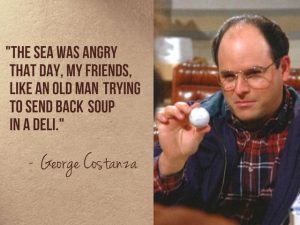
The sea was angry that day, my friends, like an old man trying to send back soup in a deli. – George Costanza, Seinfeld (Season 5, Episode 14 – The Marine Biologist)
(Image source: Playbuzz)
The analogy is one of the first rhetorical devices we learn to use in school. The basic formula is simple: take two similar ideas and connect them with “as” or “like” (which gives you a simile). They can also be more complex, making use of similes and metaphors to strengthen a comparison in the minds of readers and listeners, thus leaving a lasting impression on the audience.
Analogies are particularly useful for making complex ideas accessible by comparing unfamiliar concepts with familiar ones. Aside from providing simple explanations, they can also be used to create vivid images that engage the audience, such as “autumn leaves falling like golden rain” or “a young lady as beautiful and delicate as a rose”. Try not to use too many analogies at once, though; constantly comparing one image to another will not only get tiresome quickly, but could give the impression of unoriginality, especially if you’re comparing your work to someone else’s. Don’t make your stories as average as the next person’s!
2) Hyperbole is the greatest rhetorical device ever created!
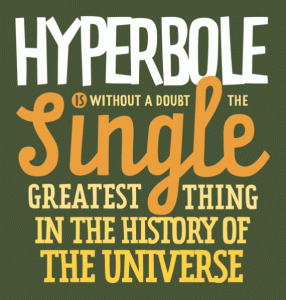 There’s nothing like exaggeration to get a point across. Who among us hasn’t shared our experiences of “the greatest thing ever”, “the worst day in history”, or “the most fun I’ve ever had in my entire life”? Hyperbole is a common device for creating emphasis, as exaggeration tends to have a great impact on an audience’s perceptions of a given description.
There’s nothing like exaggeration to get a point across. Who among us hasn’t shared our experiences of “the greatest thing ever”, “the worst day in history”, or “the most fun I’ve ever had in my entire life”? Hyperbole is a common device for creating emphasis, as exaggeration tends to have a great impact on an audience’s perceptions of a given description.
If you think about it, it’s funny how we’re inclined to exaggerate so often. After all, nobody literally “dies of embarrassment”, bags don’t literally “weigh a ton”, and friends don’t literally “go forever without seeing each other”. Yet we excuse this lack of literal sense in favor of the bolder imagery that fascinates us so, as if reaching to the limits of our imagination and beyond is simply second nature.
While it shouldn’t be used in excess, hyperbole is a good addition to any conversation that calls for dramatic emphasis. Have your characters use this device to add an informal or amusing tone to your dialogue, while in narrative you can use it to demonstrate intensity or create contrasts with normal descriptions. Use it wisely, and the hyperbole may just help you write the best stories ever!
3) Metaphors are a piece of cake.
All the world’s a stage,
And all the men and women merely players.
– William Shakespeare, As You Like It
Ah, metaphors: the celebrated heroes of poetic language. This is an especially popular device in rhetoric, using figurative speech to make strong comparisons where literal expressions would fall short. A close cousin of the simile and building block of the full analogy, the metaphor is an effective tool for constructing imagery that appeals to the audience’s imagination and draws them further into a story. Why say a soldier is “brave” when you can call him a “lion”, or say that a sound is “sweet” when you can call it “music to one’s ears”?
Metaphors have become so pervasive in modern language that we don’t even realize how heavily we rely on them in everyday speech. We suffer “broken hearts”, laugh “our heads off”, cry “rivers of tears”, and “bottle up” our anger. We’re “early birds” and “night owls”, “open books” and “loose cannons”, “black sheep” and “couch potatoes”, all lost in a “sea of faces” in the great “melting pot” that is our world. Is it even possible to speak completely literally anymore? I can only imagine how hard (and fun) it must have been to write Drax’s lines for Guardians of the Galaxy!
The metaphor is useful for creating impact in a story, so long as it’s used sparingly and with good timing. If you find your writing is lacking some flair, a well-placed metaphor, whether short and sweet or long and complex, may be just the thing to “brighten up” your story and “paint a colorful picture” in your readers’ minds!
4) Oxymorons are stupidly brilliant!
And faith unfaithful kept him falsely true.
– Idylls of the King (Alfred Tennyson, 1859–1885)
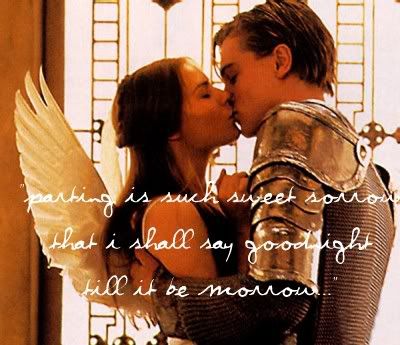
Good night, good night! Parting is such sweet sorrow / That I shall say good night till it be morrow. – Juliet Capulet (Romeo & Juliet, 2.2.185–86)
(Screencap source: Romeo + Juliet, 1996)
This is one of my favorite rhetorical devices, for even though I don’t use it often myself, I enjoy the comical irony of using opposites to create a coherent phrase. The oxymoron is a figure of speech formed by combining contradictory terms, which often leads to humorous results: “jumbo shrimp”, “found missing”, “act naturally”, and so on. Some are even taken for granted as commonplace expressions, such as “virtual reality” and “science fiction”. And what horror fan could forget the classic “living dead”?
The beauty of the oxymoron is that it can just as easily slip by unnoticed as it can make us pause to think when pointed out. In rhetoric, this device can be used to create a paradox and draw attention to a contradiction, such as in Romeo’s criticism of the contrasts of love in Shakespeare’s Romeo & Juliet:
O heavy lightness, serious vanity,
Misshapen chaos of well-seeming forms!
Feather of lead, bright smoke, cold fire, sick health,
Still-waking sleep, that is not what it is!
– Romeo Montague (Romeo & Juliet, 1.1.184–87)
Overall, oxymorons are good for creating dramatic effect in poetry and in prose. They’re also popular as satirical devices, and can make great additions to a piece of humorous writing. So the next time you feel stuck writing comedy, why not try making opposites attract? You may be able to create some “seriously funny” works!
5) I’m not saying paralipsis is an evasive maneuver, but…
 This one was recently featured as a Word of the Week on my blog. It’s common to hear people use such phrases as “I’m not saying”, “not to mention”, and “needless to say”, only to immediately follow them up with a piece of information they just said they wouldn’t talk about. This is known as paralipsis, an ironic way to draw attention to a subject by explicitly stating you won’t mention it.
This one was recently featured as a Word of the Week on my blog. It’s common to hear people use such phrases as “I’m not saying”, “not to mention”, and “needless to say”, only to immediately follow them up with a piece of information they just said they wouldn’t talk about. This is known as paralipsis, an ironic way to draw attention to a subject by explicitly stating you won’t mention it.
A relatively colloquial device, paralipsis is used most effectively in speech rather than in writing, making it a good choice for character dialogue. One of the most notable examples in literature (as pointed out by Mike of M.C. Tuggle, Writer) is Mark Antony’s speech in Shakespeare’s Julius Caesar, in which Antony brilliantly uses this device to turn the crowd against Brutus and the other conspirators:
Have patience, gentle friends, I must not read it;
It is not meet you know how Caesar loved you.
You are not wood, you are not stones, but men;
And, being men, bearing the will of Caesar,
It will inflame you, it will make you mad.
‘Tis good you know not that you are his heirs;
For if you should, O, what would come of it!
– Mark Antony (Julius Caesar, 3.2.139–45)
In rhetoric, paralipsis has several uses: to indirectly point something out, to make a passive-aggressive comment, to criticize someone without being held accountable, or to explain something while politely avoiding a suggestion of ignorance (or, alternatively, to make a sarcastic comment about the audience’s ignorance). Though it should be used carefully, this is a highly effective device that can make for some exceptionally persuasive speech. I’m not saying it’ll help you reach or even surpass the level of your favorite authors, but learning to use paralipsis well will definitely improve your proficiency as a writer!
6) I love when people take sarcasm seriously.
Irony in its sharpest form, sarcasm is hailed as one of the most beloved tools in the comedic arsenal – so much so, that it’s become nearly impossible not to hear it in some form or other in everyday speech. Sarcasm is basically the use of wit to make a point, typically in a bitter way that conveys contempt. This device comes in many flavors, including deadpan, self-deprecating, manic, and even polite. It’s used to amusingly draw attention to the obvious, to mock oneself or others, or simply as a coping mechanism to make the frustrations of life a little more bearable. I know I’ve had those days that I couldn’t survive without a little sarcasm to tide me over!

Leonard has to clue Sheldon in on Penny’s sarcasm (The Big Bang Theory: Season 1, Episode 2 – The Big Bran Hypothesis)
(Image source: Tumblr)
Given its acidic nature, sarcasm is best exercised with caution. Like most humor techniques, it’s hard to teach because each person uses it differently and even harder to master because not everyone understands it, but sarcasm in particular is worth the effort as it’s a strong indicator of the writer and the readers’ intelligence. Use it in dialogue to demonstrate a character’s sharp wit or occasionally in narrative to indirectly criticize people and society, and if you must use it to address your readers, at least try not to be too offensive and alienate an audience who have no sense of humor. Or, you know, just do whatever you want. Why give a damn what the rest of the world thinks?
What are your thoughts on these rhetorical devices? Any other favorites you would add to this list?
by Naomi L. | November 2, 2016 | Blog, Creative Writing |
Welcome to November! National Novel Writing Month is upon us again, a whole 30 days for writers to put their excuses aside, scrape together all those loose ideas, and finally write that 50,000-word novel! It’s certainly an intimidating task to say the least, but a little motivation can go a long way in helping you get started. Last year, I shared some helpful writing tips in the form of 10 inspirational quotes from famous authors, so this year I’m sharing some more quotes, this time about the creative process and what it means to be a writer.
So on that note, here are 10 more inspirational writing quotes for novel-writing motivation. Enjoy, and good luck in this year’s NaNoWriMo!
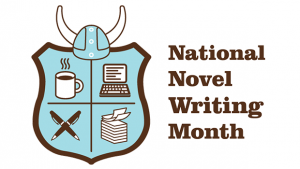
National Novel Writing Month
1) The scariest moment is always just before you start. – Stephen King, On Writing: A Memoir of the Craft
2) And by the way, everything in life is writable about if you have the outgoing guts to do it, and the imagination to improvise. The worst enemy to creativity is self-doubt. – Sylvia Plath, The Unabridged Journals of Sylvia Plath
3) Tomorrow may be hell, but today was a good writing day, and on the good writing days nothing else matters. – Neil Gaiman
4) There is no greater agony than bearing an untold story inside you. – Maya Angelou, I Know Why the Caged Bird Sings
5) You must write every single day of your life… You must lurk in libraries and climb the stacks like ladders to sniff books like perfumes and wear books like hats upon your crazy heads… may you be in love every day for the next 20,000 days. And out of that love, remake a world. – Ray Bradbury
6) Those who find ugly meanings in beautiful things are corrupt without being charming. This is a fault. Those who find beautiful meanings in beautiful things are the cultivated. For these there is hope. They are the elect to whom beautiful things mean only Beauty. There is no such thing as a moral or an immoral book. Books are well written, or badly written. That is all. – Oscar Wilde, The Picture of Dorian Gray
7) I can shake off everything as I write; my sorrows disappear, my courage is reborn. – Anne Frank
8) Lock up your libraries if you like; but there is no gate, no lock, no bolt that you can set upon the freedom of my mind. – Virginia Woolf, A Room of One’s Own
9) The first draft is just you telling yourself the story. – Terry Pratchett
10) Start writing, no matter what. The water does not flow until the faucet is turned on. – Louis L’Amour
What are your thoughts on these writing quotes? Any others you’d add to the inspirational list for NaNoWriMo?
 1) You may say I’m a dreamer, but I’m not the only one. I hope someday you’ll join us. And the world will live as one. – John Lennon
1) You may say I’m a dreamer, but I’m not the only one. I hope someday you’ll join us. And the world will live as one. – John Lennon

 1) All of a sudden: an alternative expression for “suddenly”. Write “all of a sudden”, not “all of the sudden”.
1) All of a sudden: an alternative expression for “suddenly”. Write “all of a sudden”, not “all of the sudden”.
 There’s nothing like exaggeration to get a point across. Who among us hasn’t shared our experiences of “the greatest thing ever”, “the worst day in history”, or “the most fun I’ve ever had in my entire life”? Hyperbole is a common device for creating emphasis, as exaggeration tends to have a great impact on an audience’s perceptions of a given description.
There’s nothing like exaggeration to get a point across. Who among us hasn’t shared our experiences of “the greatest thing ever”, “the worst day in history”, or “the most fun I’ve ever had in my entire life”? Hyperbole is a common device for creating emphasis, as exaggeration tends to have a great impact on an audience’s perceptions of a given description.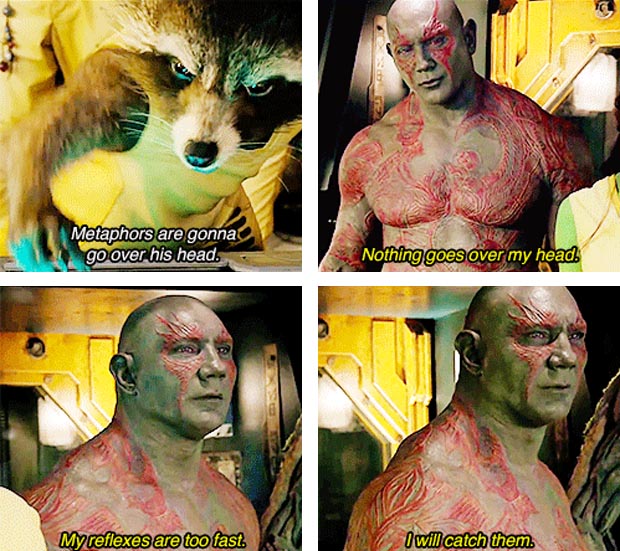

 This one was
This one was 


Recent Comments